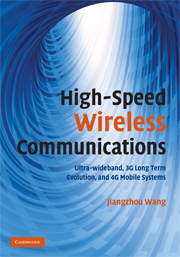Book contents
- Frontmatter
- Contents
- Preface
- Acknowledgements
- List of abbreviations
- Part I Introduction
- Part II UWB communications
- Part III Evolved 3G mobile communications
- Part IV 4G mobile communications
- 9 Optimal and MMSE detection for downlink OFCDM
- 10 Hybrid detection for OFCDM systems
- 11 Coded layered space-time-frequency architecture
- 12 Sub-packet transmission for hybrid ARQ systems
- Index
- References
10 - Hybrid detection for OFCDM systems
from Part IV - 4G mobile communications
Published online by Cambridge University Press: 27 May 2010
- Frontmatter
- Contents
- Preface
- Acknowledgements
- List of abbreviations
- Part I Introduction
- Part II UWB communications
- Part III Evolved 3G mobile communications
- Part IV 4G mobile communications
- 9 Optimal and MMSE detection for downlink OFCDM
- 10 Hybrid detection for OFCDM systems
- 11 Coded layered space-time-frequency architecture
- 12 Sub-packet transmission for hybrid ARQ systems
- Index
- References
Summary
As discussed in the last chapter, in a Gaussian or flat fading channel, multicode channels are orthogonal. In a realistic wireless channel, however, the orthogonality no longer maintains. Thus, MCI is caused. In this chapter, a novel detection method, called hybrid MCI cancellation and MMSE detection, is proposed and compared with pure MMSE detection. The system performance is analytically studied with imperfect channel estimation to show how it is affected by parameters such as the window size in the channel estimation, Doppler shift, the number of stages of the hybrid detection, the power ratio of pilot to data channels, spreading factor, and so on.
Introduction
Although MMSE detection can suppress MCI as discussed in the last chapter, so far MMSE detection has not been investigated for the OFCDM system with interference cancellation. Figure 10.1 illustrates the situation when MMSE detection is employed with MCI cancellation. It can be seen that the input to the MCI canceller is a combination of the useful signal, MCI and background noise. After MCI cancellation, the useful signal and background noise remain unchanged, but MCI is reduced. The combined signal is input to the MMSE detector with estimated signal plus interference power. Then the weighted output is generated after MMSE detection. Since the weight of MMSE is related to the input signal plus interference power, it should be updated stage by stage because the input power of MCI changes due to MCI cancellation.
- Type
- Chapter
- Information
- High-Speed Wireless CommunicationsUltra-wideband, 3G Long Term Evolution, and 4G Mobile Systems, pp. 253 - 277Publisher: Cambridge University PressPrint publication year: 2008



